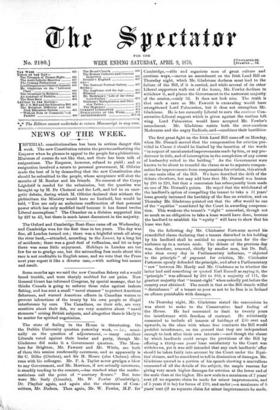The state of feeling in the House is threatening. On
the Dublin University question yesterday week, — i.e., nomi- nally on the question of adjournment, — many excellent Liberals voted against their leader and party, though Mr. Gladstone did make it a Government question. The Mem- bers for Brighton, Mr. Fawcett and Mr. White, are both of them this session confirmedly cavernous, and so apparently is Sir C. Dilke (Chelsea), and Sir H. Hoare (also Chelsea) often runs with his colleague. Mr. P. A. Taylor never grudges a blow to any Government, and Mr. Morrison, if not actually cavernous, is steadily tending to the concave,—has reached what the mathe- maticians call the point of " contrary flexure." But here were Mr. Seely (Lincoln), Mr. W. Fowler (Cambridge), Dr. Playfair again, and again also the chairman of Com- mittees, Mr. Dodson. Then again, Mr. W. Fowler, M.P. for Cambridge,—able and sagacious man of great culture and cautious ways,—moves an amendment on the Irish Land Bill on Thursday night, which Mr. Gladstone declares must lead to the failure of the Bill, if it is carried, and while several of its other Liberal supporters walk out of the house, Mr. Fowler declines to withdraw it, and places the Government in the narrowest majority of the session,—only 32. It does not look nice. The truth is that such a cave as Mr. Fawcett is excavating would have strengthened Lord Palmerston, but it does not strengthen Mr. Gladstone. He is too earnestly Liberal to earn the cautious Con- servative-Liberal support which is given against the restless left wing. Lord Palmerston would have accepted Mr. Fowler's amendment. Mr. Gladstone resists both the over-cautious Moderates and the angry Radicals, and—combines their hostilities.


































